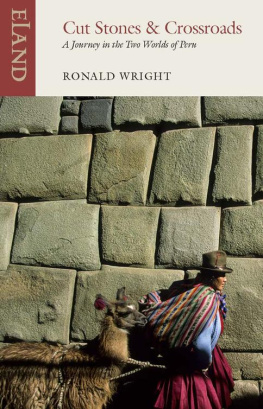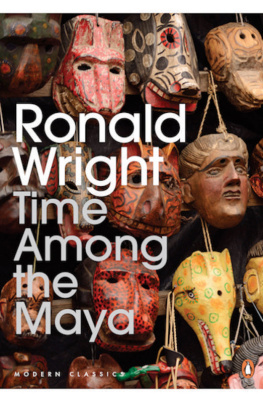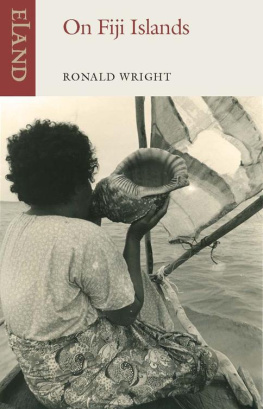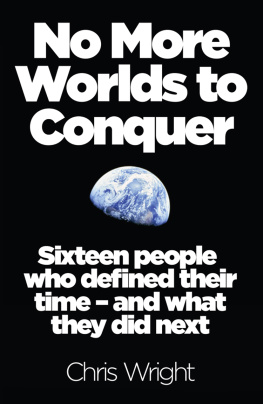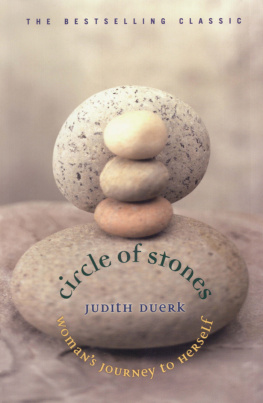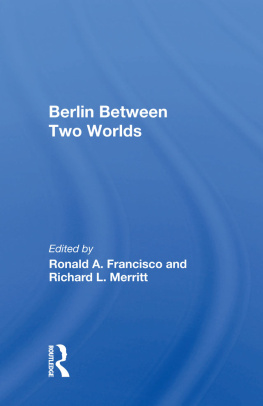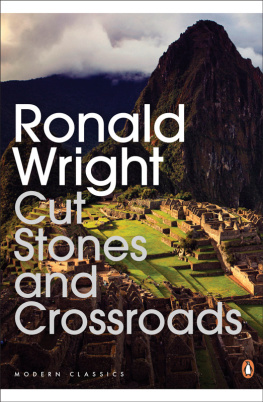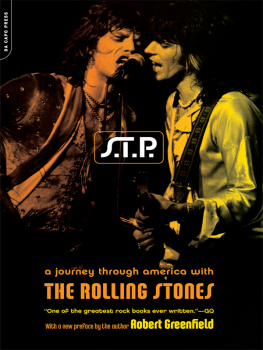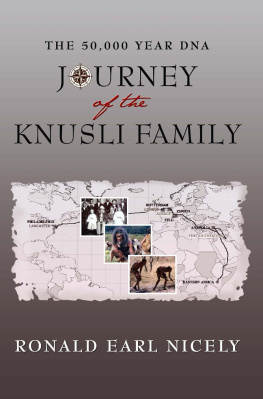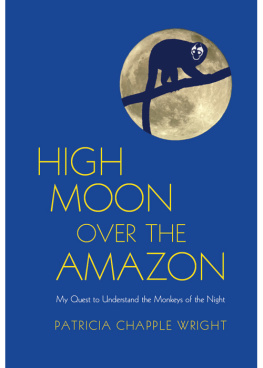Ronald Wright - Cut Stones and Crossroads: A Journey in the Two Worlds of Peru
Here you can read online Ronald Wright - Cut Stones and Crossroads: A Journey in the Two Worlds of Peru full text of the book (entire story) in english for free. Download pdf and epub, get meaning, cover and reviews about this ebook. year: 2020, publisher: Eland Publishing, genre: Detective and thriller. Description of the work, (preface) as well as reviews are available. Best literature library LitArk.com created for fans of good reading and offers a wide selection of genres:
Romance novel
Science fiction
Adventure
Detective
Science
History
Home and family
Prose
Art
Politics
Computer
Non-fiction
Religion
Business
Children
Humor
Choose a favorite category and find really read worthwhile books. Enjoy immersion in the world of imagination, feel the emotions of the characters or learn something new for yourself, make an fascinating discovery.
- Book:Cut Stones and Crossroads: A Journey in the Two Worlds of Peru
- Author:
- Publisher:Eland Publishing
- Genre:
- Year:2020
- Rating:3 / 5
- Favourites:Add to favourites
- Your mark:
- 60
- 1
- 2
- 3
- 4
- 5
Cut Stones and Crossroads: A Journey in the Two Worlds of Peru: summary, description and annotation
We offer to read an annotation, description, summary or preface (depends on what the author of the book "Cut Stones and Crossroads: A Journey in the Two Worlds of Peru" wrote himself). If you haven't found the necessary information about the book — write in the comments, we will try to find it.
Cut Stones and Crossroads: A Journey in the Two Worlds of Peru — read online for free the complete book (whole text) full work
Below is the text of the book, divided by pages. System saving the place of the last page read, allows you to conveniently read the book "Cut Stones and Crossroads: A Journey in the Two Worlds of Peru" online for free, without having to search again every time where you left off. Put a bookmark, and you can go to the page where you finished reading at any time.
Font size:
Interval:
Bookmark:
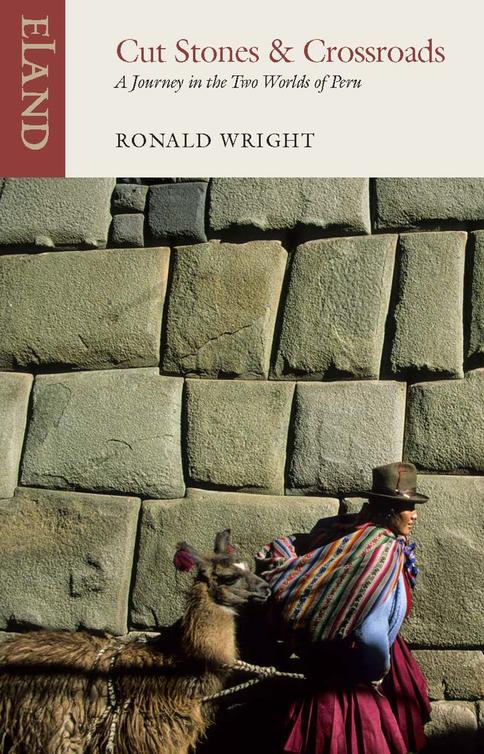
iii
Taytamamayman
To my parents
by Alberto Manguel
From time to time, God causes men to be bornand thou art one of themwho have a lust to go abroad at the risk of their lives and discover newsto-day it may be of far-off things, tomorrow of some hidden mountain.
Rudyard Kipling, Kim
The great twelfth-century traveler Ibn al-Arabi defined the very origin of our human existence as movement. Immobility can have no part in it, wrote Ibn al-Arabi, for if existence were immobile it would return to its source, which is the Void. That is why the voyaging never stops, in this world or in the hereafter. With a malicious linguistic twist, Ibn al-Arabi confuses our endless movement through time, from cradle to grave, with a pragmatic movement through space. Certainly, even cloistered in ones room for the whole of ones life, one is condemned to travel through the years, hour after hour, each one wounding us, as a sundial motto has it, until the last one kills us. And yet, an opponent of Ibn al-Arabi might have argued movement from one point of this earth to another is merely a succession of moments of being still: our geography exists only in the instant in which we are there, standing on our own two feet.
This notion of travel as moving through space, but also being in one place at a time, is vividly exemplified in the travel books of Ronald Wright, Cut Stones and Crossroads and Time Among the Maya, and in the history told in Stolen Continents. For several decades now, he has diligently chronicled the ancient civilizations of Latin America, traveling through Peru and Mexico, and rooting himself in a succession of historical moments, visiting not only the present landscapes but also those long vanished, like the courageous Time Traveller imagined by H.G. Wells. Wright witnesses the past from the vantage point of the present and reports back to us. x
Because of this ability to see what once was in the context of what now remains, his books translate his observations into essays that artfully combine travelogues with archaeological research, and political science with anthropology. The strategies of political power in our time and the weight of a fading tradition, the social memory of past events and the construction of the idea of history, the confused or lost identity of a conquered people and the identities imposed by the conquerorall these themes weave through Wrights books forming complex and illuminating patterns that allow the reader to share and begin to understand the crossroads to the past.
Wrights writing is not limited to essays; he is also the author of remarkable works of fiction. Aware that, to a degree, the material evidence of his travels curtails the scope of an explorers curiosity, Wright decided, a few years after publishing his travel books, to expand his wanderings into the realm of the imaginary. The result was two splendid novels of adventure: first, the prescient and terrifying A Scientific Romance and then Hendersons Spear with its parallel universes of sea travel and exploration. A Scientific Romance imagines a Britain turned tropical jungle in the climate changes of the not-too-distant future; Hendersons Spear conjures up the tale of a South Sea voyage undertaken during the Victorian age. Both are also travel books, and the fact that they never took place in reality does not disqualify them from being authentic.
Authenticity is the essential quality of all travel literature, imaginary or real. The vocabularies of the culture that formed us can distort or make us see a reality that is not that of the land extending before us, unless we place ourselves not in the position of someone who knows the answers but someone who is interested in the questions. Robert Frosts dictum that the land was ours before we were the lands is lethal to the observant traveler. Authenticity implies giving oneself over to the thing observed.
And yet, there is a paradox in the art of travel that seems impossible to overcome in order to achieve this required authenticity: that every discovery always entails some measure of recognition. Even as we set out, with unprejudiced eyes, to explore places where we have never been before, we are still incapable of seeing something entirely new if it xi were to appear suddenly before our eyes. We are all to a certain degree like Christopher Columbus who, during his third voyage to the New World, saw three manatees swimming near the mouth of the Orinoco River and jotted down in his journal, written in the third person, that today the Admiral saw three mermaids. (His honesty compelled him to add, But they are not as beautiful as they are supposed to be.) Fortunately, it is not how Ronald Wright has traveled.
When Cut Stones and Crossroads appeared in 1984, it was immediately hailed as a new kind of travel book, made up of personal anecdotes, erudite observations, fragments of conversations, and historical notes. The subtitle, A Journey in the Two Worlds of Peru, prepares the reader for the observation of a schizophrenic culture, half steeped in its Inca past, half suffering from the onslaught of the world of our century. The guide on this journey is an affable, intelligent, humorous Canadian (Wright was born in England) with a profound feeling for the complexities of the land of Peru, an aesthetic and historical appreciation of the ancient culture of the Incas, and a deep respect for the survivors of what was once one of the greatest empires in the history of the world.
Wrights generous, erudite mind illuminates the readers journey. The reader learns on one page that missionary evangelism for its own sake was virtually unknown in pre-Conquest American religions, and on another of the Latin American belief in the power of architecture to create institutions. One passage dwells on the fact (incomprehensible in capitalist societies) that gold and silver had no monetary value to the Incas: they were substances of beauty and religious meaning, the sweat of the sun and the tears of the moon, another on the qualities of pisco and coca. And reflections like the following, this one on the Runasimi language of the native people of Peru, threatened with extinction, lend universal meaning and particular purpose to Wrights story:
Languages describe the world; like art styles, they emphasize some facets of reality, ignore others, and create categories of their own for which there may be no objective reason and no parallels in another tongue. Languages shape, and are shaped by culture as a whole. When people lose their xii language for another, profound distortions may affect their vision of the world: as if Hieronymus Bosch were suddenly forced to paint in the style of John Constable.
I want to know everything, says a character toward the end of one of Wrights novels, Hendersons Spear. Conscious that such an ambition is beyond human scope, Wright has chosen to show the vast and complex history of Peru, from its origins to the present, through the scattered fragments observed by a contemporary pilgrim. Wright has an eye for the telling trifle, an ear for the revealing snippet, a taste for the quietly heroic and the little absurdities of life. Like his English masters in the travel-writing genreRobert Byron, Freya Stark, Alexander William KinglakeWright is capable of bringing a certain quality of both measured guesswork and irrefutable logic to what he observes, never allowing his personal experience to color the entire picture. He is present in his story, certainly, as the narrator and the observer, but he never imposes his vision on the landscape, never translates the things he sees into a vocabulary that was invented to name other things. When Wright sees manatees they remain manatees.
Font size:
Interval:
Bookmark:
Similar books «Cut Stones and Crossroads: A Journey in the Two Worlds of Peru»
Look at similar books to Cut Stones and Crossroads: A Journey in the Two Worlds of Peru. We have selected literature similar in name and meaning in the hope of providing readers with more options to find new, interesting, not yet read works.
Discussion, reviews of the book Cut Stones and Crossroads: A Journey in the Two Worlds of Peru and just readers' own opinions. Leave your comments, write what you think about the work, its meaning or the main characters. Specify what exactly you liked and what you didn't like, and why you think so.

